Inter Vivos QTIP Trust (10 Pages)
In stock
SKU
IntervivosQTIPTrust
$49.00
This is an irrevocable trust created by one spouse while alive for the lifetime benefit of the other spouse. It may be referred to as an Inter Vivos QTIP Trust. The trust is designed to obtain the benefit of the gift tax marital deduction upon its creation. The trust meets the statutory QTIP requirement of providing income for the life of the beneficiary spouse payable at least annually. The trust also gives the trustee discretion to pay the beneficiary spouse principal for health, support and maintenance.
This is an irrevocable trust created by one spouse while alive for the lifetime benefit of the other spouse. It may be referred to as an Inter Vivos QTIP Trust. The trust is designed to obtain the benefit of the gift tax marital deduction upon its creation. The trust meets the statutory QTIP requirement of providing income for the life of the beneficiary spouse payable at least annually. The trust also gives the trustee discretion to pay the beneficiary spouse principal for health, support and maintenance.
When the beneficiary spouse dies, the disposition of the trust property depends on whether the Grantor is still living. If the Grantor is then living, the trust property continues to be held in trust with the trustee having discretion to pay the income and principal of the trust to either the Grantor, or to the Grantor’s then living issue for health, education, support and maintenance. Since the QTIP trust property will be included in the taxable estate of the beneficiary spouse, it may be used to fund an exemption equivalent (unified credit) trust for the benefit of the Grantor without being included in the taxable estate of the Grantor.
If the Grantor is not living when the beneficiary spouse dies, the trust property is then divided among the issue of the Grantor, per stirpes. This enables the Grantor to provide a benefit for the beneficiary spouse while such spouse is living, but control the ultimate disposition of the trust property in accordance with the Grantor’s own wishes. A trust such as this is an excellent planning technique for a “blended family” where the current spouses have children from earlier marriages.
Note the language in Article 2.5 addressing the making of the appropriate QTIP elections. Different scenarios may be possible where it is unclear who has the responsibility for making the appropriate QTIP election (personal representative, trustee, etc.). This Article is designed to give the trustee, if necessary, the authority to make the necessary elections.
Author:
Steven G. Siegel is president of The Siegel Group, a Morristown, New Jersey - based national consulting firm specializing in tax consulting, estate planning and advising family business owners and entrepreneurs. Mr. Siegel holds a BS from Georgetown University, a JD from Harvard Law School and an LLM in Taxation from New York University.
Author:
Steven G. Siegel is president of The Siegel Group, a Morristown, New Jersey - based national consulting firm specializing in tax consulting, estate planning and advising family business owners and entrepreneurs. Mr. Siegel holds a BS from Georgetown University, a JD from Harvard Law School and an LLM in Taxation from New York University.
He is the author of several books, including: Planning for An Aging Population; Business Entities: Start to Finish; Taxation of Divorce and Separation; Income Taxation of Estates and Trusts, Preparing the Audit-Proof Federal Estate Tax Return, Putting It Together: Planning Estates for $5 million and Less, Family Business Succession Planning, Business Acquisitions: Representing Buyers and Sellers in the Sale of a Business; Dynasty Trusts; Planning with Intentionally-Defective Grantor Trusts; The Federal Gift Tax: A Comprehensive Analysis; Charitable Remainder Trusts, Grantor Trust Planning: QPRTs, GRATs and SCINs, The Estate Planning Course, The Retirement Planning Course, Retirement Distributions: Estate and Tax Planning Strategies; The Estate Administration Course, Tax Strategies for Closely-Held Businesses, and Tort Litigation Settlements: Tax and Financial Issues.
Mr. Siegel has lectured extensively throughout the United States on tax, business and estate planning topics on behalf of numerous organizations, including National Law Foundation, AICPA, CCH, National Tax Institute, National Society of Accountants, and many others. He has served as an adjunct professor of law at Seton Hall and Rutgers University law schools.
The Siegel Group provides consulting services to accountants, attorneys, financial planners and life insurance professionals to assist them with the tax, estate and business planning and compliance issues confronting their clients. Based in Morristown, New Jersey, the Group has provided services throughout the United States. The Siegel Group does not sell any products. It is an entirely fee-based organization. Contact the Siegel Group through its president, Steven G. Siegel, e-mail: [email protected].
We found other products you might like!
-
 12 Will Forms (168 Pages)$159.00
12 Will Forms (168 Pages)$159.00 -
 Trusts (8 Books) - 313 PagesSpecial Price $129.00 Regular Price $160.00
Trusts (8 Books) - 313 PagesSpecial Price $129.00 Regular Price $160.00

